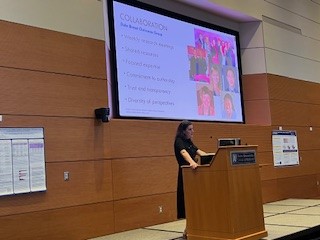Women's Reproductive Health Research (WRHR) Program
Call for Applications is Open!

The WRHR program provides opportunities for obstetrician-gynecologists to obtain state-of-the-art training and experience in basic, translational and clinical women's reproductive health research. The WRHR program is funded through NICHD's Gynecologic Health and Disease Branch and co-sponsored by the NIH Office of Research on Women's Health (ORWH).
The Duke WRHR training program combines cutting-edge research experiences with an innovative and proven career development framework to help develop the next generation of ob/gyn clinician-scientists. Our program supports up to two WRHR early stage faculty at any one time, across these categories of clinically relevant research:
- discovery of causal mechanisms
- translation of discovery into specific interventions
- testing interventions for safety, efficacy, and effectiveness
- implementing effective interventions into clinical practice and public health
Call for Applications is open. Applications are due January 15, 2026.
The Duke WRHR program has up to 2 active scholars at a time. WRHR scholars will receive salary and fringe benefit support (up to $100,000) for 50 - 75% of full professional effort. Research and career development support up to $25,000 per year will be provided for research supplies and equipment, technical personnel, tuition and fees related to didactic courses or career development and travel to research meetings. Scholars are expected to publish and obtain independent grant funding by Year 3. Maximum support is for 5 years. We expect to appoint one new WRHR Scholar in March 2026.
Each scholar will work closely with one or more mentors with extensive research experience related to their research focus. Additionally, WRHR scholars are expected to participate in research and professional development activities, including WRHR specific activities organized by the program director.
Duke University offers equal opportunity to all applicants without regard to ethnicity, race, color, creed, sex, gender, age, disability or national origin.
Eligibility Requirements
- Committed to a career in research relevant to women’s reproductive health.
(Research with a primary focus on health care delivery, health care services, or health policy is outside the scope of this program). - Within either
- 4 years after completion of an OB/GYN residency or
- 4 years after completion of subspecialty training in MFM, gynecologic oncology, REI, FPMRS, family planning, MIGS, or global health
- U.S. citizen, non-citizen national or have permanent residency (green card) at the time of appointment
- You are (or you will be at the time of appointment) in a position at Duke that will allow you to devote
50 - 75% of your full-time professional effort (6 - 9 person months) to research and career development for a minimum of 2 years.- In a faculty appointment at Duke below the level of associate professor, or
- In a fellowship at Duke that will allow 2 years on the WRHR
- You have not served as PI or PD on:
- an R01, R29, U01/U10, subproject of a Program Project (P01), Center (P50, P60, U54) grant
- individual mentored or non-mentored career development award (e.g., K01, K02, K08, K22, K23, K24, K25, K99)
Application Process
We encourage all applicants to contact program leadership to discuss eligibility, mentor selection, and any questions about the program or the application process:
Evan R. Myers, MD, MPH
Program Director
Email: evan.myers@duke.edu
Friederike L. Jayes, DVM, PhD
Program Coordinator
Email: friederike.jayes@duke.edu
All components of the application must be submitted by email as separate Word or PDF documents to evan.myers@duke.edu and friederike.jayes@duke.edu.
The application must include the following:
- NIH Biosketch (new format with eRA Commons name and link to NCBI bibliography)
- Project title and a two-sentence description of the research project
- A personal statement (2 pages max) that includes:
- Description of long-term career goals
- Professional development plan: Description of career development goals (include course work, training, etc.) for the next 2-3 years
- Description how your mentor(s) will support you in your career development endeavors
- Description of how the WRHR program will help meet your career/professional development goals
- Plan for securing 50 - 75% protected research time and commitments for your 25 - 50% non-WRHR time
- A brief research proposal (max. 3 pages plus references) for a specific project to be accomplished during the next 2-3 years. Describe how your mentor(s) will support you in your research.
- Budget outline: Explain how you would use up to $25,000/year for research and career development expenses (includes max. $3500 for travel). Include other funding sources if your project costs will likely exceed $20,000/year.
- Plan for future funding (1 page): Briefly describe what question your future major grant application will investigate. Describe how the completion of your proposed WRHR project and your proposed career development goals will support that future major grant application.
- List of mentor(s): Although applicants are strongly encouraged to work with mentors who have already expressed a willingness to work with WRHR Scholars, we recognize that in some cases scholars may need specialized training that is not covered by our current mentors. For any new mentors, list their name(s), degree(s), academic ranks, affiliations (department, division, school) and disciplines/fields of research.
- Letters of support. All applicants should submit letters from:
- All proposed mentors. Each letter should include how the mentor will support your research project, your career and professional development, and a plan for regular interactions.
- Chief of the appropriate division of your department. The letter should include a description of how you will be able to fulfill the requirement of 50 - 75% full professional effort devoted to research and career development.
- Applicants from outside Duke should also submit at least one letter of support/evaluation from a current or past colleague or mentor who is knowledgeable about your prior accomplishments and suitability for this program.
WRHR scholars also participate in the Research Scholars Educational Training (ReSET) Program which provides structured, real-time grant writing support and welcomes all OBGYN trainees, faculty, and K12 scholars. Lectures and workshops are generally held on the 4th Wednesday of each month at Baker House Room 214. Scholars who are submitting an external grant in the next 3-6 months may Request a personal Grant Development Support (GRADS) Team to help get a grant out the door. Learn more on the ReSET website.
Announcements
2026 Women's Health Research Symposium

Faculty, trainees, staff, and students at any level are invited to attend to annual Women's Health Research Symposium on Friday, Feb 6, 2026 at Duke's Trent Semans Great Hall, featuring poster showcase, K12 scholar presentations, and roundtable discussions.